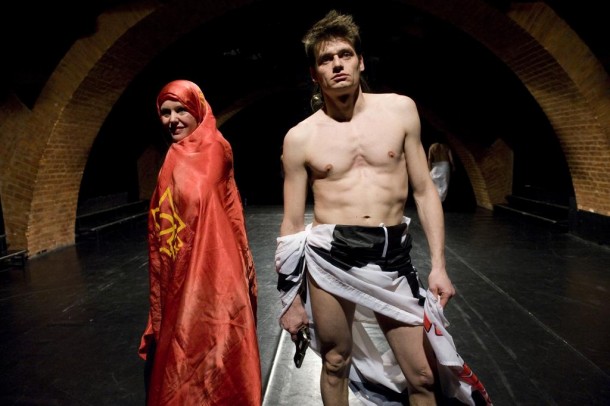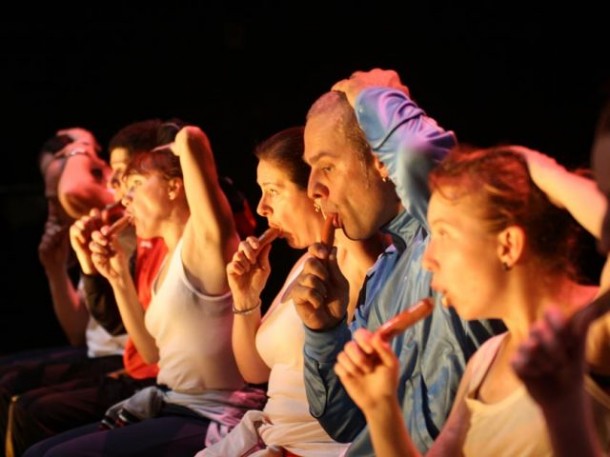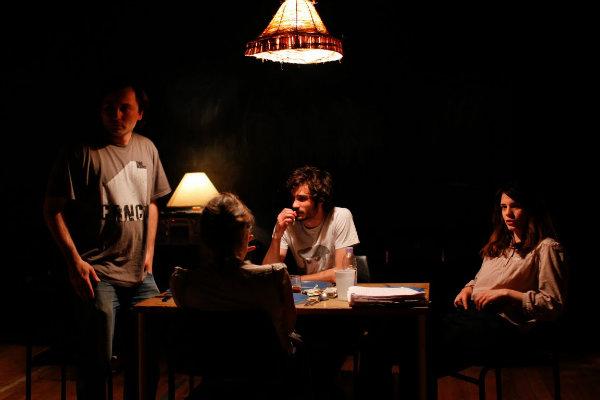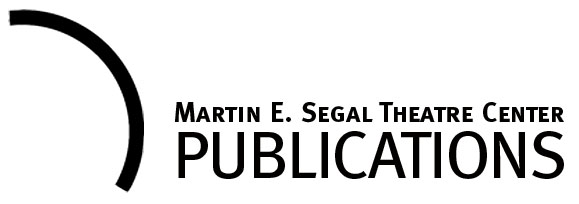One of the nine performers belonging to the Mladinsko Theatre company from Slovenia stands on the empty stage facing the Romanian audience huddled in a small black box venue and tells us how the director of the piece we are about to watch—Oliver Frljić, wryly described by critic Nataša Govedić in New Performing Arts Practices in Eastern Europe (211) as “post-Bosnian, ex-Yugoslav, and currently Croatian”—came to their theatre with the intention “to do a show about the conflict between Slovenians and Croats, a conflict that never was, and never will be.” Damned Be the Traitor of His Homeland addresses the violence that has ripped apart the people and territories of the former Yugoslavia in its inter-ethnic wars and genocides of the 1990s. It challenges the claim that Slovenians were not involved in the conflict, thus revealing the intensely problematic incapacity to assume responsibility for the past, to recognize its legacies, and to distinguish just how deeply violence has remained nested in our midst and is still shaping our reality. Oliver Frljić uses the theatre to create a public forum for open debate, a recurrent impulse in Eastern-European contemporary performance towards shaping theatre as a truth and reconciliation committee.
The title of the piece—Damned Be the Traitor of His Homeland!—is actually the last verse from the song Hej, Slaveni (Hey, Slavs) composed in the nineteenth century as a battle cry of the pan-Slavic nationalistic movement in the Balkans at the height of independence movements bubbling across Eastern Europe. The performance space occasionally resounds with Bijelo Dugme’s 1984 cover song of Hej, Slaveni, in a modern interpretation that served as the unofficial hymn of former Yugoslavia. Although the show is heavily sprinkled, including the title itself, with references and allusions to details of the local context and history, it clearly confronts the dangerously ignorant and stubbornly deliberate amnesia of the “never was and never will be.” Damned Be speaks to me, a Romanian unfortunately accustomed to the traumas, negations, and incapacities for real dialogue that plague post-communist societies. In light of the recent invasion of Ukraine, and the disturbing rise of right wing, pro-nationalist factions across the European Union, there cannot be any clearer signs that the past is doomed to haunt us. Damned Be is bound to resonate with anybody hit by the violence of ultra-nationalistic zeal and discrimination in overdrive.
But I am getting ahead of myself. I suspect the show can be thoroughly enjoyable—if “enjoyable” is the right word for something so bleak—even if one is largely unconcerned with politics, and simply lets oneself be entertained by the peregrination of skits, many of them exhibiting a sardonic humor. The episodic structure of the piece was devised in a rehearsal process demanding nothing but cutthroat honesty and extreme vulnerability from the company members. As an audience member, I felt oddly grateful for the risks taken, even as the actors were literally swearing at me.
The piece revolves around the sharing by each performer of private thoughts, experiences, and memories offered to the director as material to be staged. For example, each performer tells us where they were, what they were doing, and what was their reaction at the news of Tito’s death. The direct address of performer-to-audience, the use of non-fictional material, the dramaturgy of moments and interconnected scenes, the bare stage on which performers occasionally proclaim “I hate theatre” recurred throughout the 2014 Sibiu International Theatre Festival in Romania. Such practices only attest to the liveliness of the search for effective means of expression to breach urgent contemporary political and social themes.
Damned Be premiered in Ljubljana in 2010, yet the distance measured in years from its opening can hardly be felt while watching it. The piece hits raw nerves and leaves you shaken, which indicates its continued relevancy in our still deranged cultural setting. The performance starts gently, with all the actors lying on the floor each clutching a different musical instrument. They gradually begin to play a beautiful, unmistakenly Balkan mournful melody, louder and louder. Later in the show, the same tune—a famous anti-war song called “I won’t kill my brother” by Rade Šerbedžija featuring Ceca—will prove to be a sensitive topic for the company members, since, ironically, Ceca was the starlet wife of a warlord. But without this information, the horizontal positions, the dim lights, and the melancholic tune at the opening of Damned Be weave together an elegiac atmosphere, mourning the fallen.
The mood shifts as soon as the performers stand up to deliver in an upbeat tone their own obituaries, invariably and hilariously having something to do with “the wanking scene from Oliver Frljić’s movie Hej, Slaveni.” This scene too ends once one of the performers unexpectedly and shockingly pulls out a gun and shoots all of the rest point blank. Now we know why each spectator was given ear plugs, and was encouraged to use them as part of the customary announcement at the beginning of each show: not because of the brass sounds of the Eastern-European soundscape, but because of the gunshots as part of the Eastern-European soundscape. It is these surprising, jarring constant shifts of tone, bobbing from mournful to comedic and to tragic, from one scene to the next, that keeps the show always at a high pitch. Music and the shooting guns coalesce the scenes into an evocative whole. A few other episodes will end abruptly with the motif of one performer shooting the others out of the scene.
Another recurring device is the use of flags—the many different flags of the region: flags that are displayed or worn as in a fashion show, flags that cover dead bodies, and flags that are desecrated when some performers wipe themselves with and spit on them (as apparently Oliver Frljić asked them to do in a rehearsal).
Provocation functions as generative strategy throughout the show—Frljić provoked the actors to generate material, and the actors provoke the audience in order to generate response and involvement. In one scene, the performers chant in an eerie choir all the worse possible racist insults they can think of, targeting Croats, Serbs, Roms, Romanians, and so on. In another scene, the male performers in the company, aligned in front of us, take turns to point at a specific audience member (always also male) to describe to them, in graphic detail and with a lusciousness of colorful words, how exactly they would penetrate them. But if at this sort of abuse the audience chuckled and giggled, nobody really laughed when one performer explained how in this point in the show he would usually spew at the Slovenian audience the dirty secrets of their country’s involvement in the bloodshed of the 1990s. In the festival context, however, he proceeded to berate Romanian corruption and political complacency, such as the opportunistic support given to NATO forces when it dropped bombs on our neighbors.
Oliver Frljić has a reputation for creating highly controversial shows, riding on the sparks of public scandal. Currently, he is one of the most talked about theatre directors in Croatia. Performance scholar Suzana Marjanić in New Performing Arts Practices in Eastern Europe (132) lists some of Frljić’s recent provocations:
His 2008 version of Euripides’s Bacchae contained uncomfortable parallels with crimes committed during the Homeland War of 1991-95, and was notoriously removed from the repertoire by the Croatian National Theatre in Split. No less provocative was 2009 Turbo-Folk, a cocktail of sex, violence, and Serbian folk-pop […] or his abrasive, socially critical play Zoran Đinđić (dealing with the assassination of Serbian prime-minister Đinđić in 2003), performed in Belgrade in 2012, which provoked mass walk-outs and standing ovations in equal measure.
Frljić takes it as his mission to scratch the wound of public guilt: “Croatia has a problem with anything that brings into question the fake, constructed image of the Homeland War and its narratives,” he says in an interview conducted by Marjanić (all subsequent Frljić quotations will be from that interview, in the work already cited) explaining his intention to dispel nationalistic fantasies. One scene in Damned Be starts off unobtrusively with the performers seemingly relaxing and hanging out after a rehearsal. What at the beginning seems harmless joking banter quickly escalates to verbal projectiles: Are you a Croat or a Slovene? A Croat? But isn’t your mother Croat? If your mother is a Croat, how did you come out Slovenian? If your mother were black would you have come out white? Wait, don’t you have a summer house in Croatia? What flag do you wave from the boat you have in your summer house in Croatia? Eventually, the eight of them pack together and kill the ninth, the one singled out, the ethnically impure, the person of doubtful allegiance to the flag. In an increased delirium, the slaughter continues, the mob singling out and attacking people in the group one after another until none is left. The bodies are then covered in flags.
The scene is of course an exaggerated rendition of violent nationalism and ethnically-based discrimination. It aptly points to Frljić taking issue with the official denial of responsibility for historical crimes, and the cultural practice of constructing narratives for the past exonerating us of all complicity, and portraying us instead as victims of history. “I was interested in seeing what would happen if a society was to be knocked from its self-victimizing matrix,” says Frljić in the same interview.
The impulse of unmasking the crimes of our collective past and of reassessing official history often pops up in Eastern-European theatre. The official discourse, taught in schools and propagated by the political leadership portrays the “small” Eastern European countries as defenseless victims suffering from authoritarian regimes trapped in the whirlpool of history, which never willingly cooperated or independently conducted acts of aggression. Theatre- makers like Frljić go against such assumptions and attempt to uncover hidden versions of past events. This phenomenon may be called theatre as truth-and-reconciliation. In the absence of official public investigations, recognition and atonement for past crimes (as it happened in Germany), theatre attempts to take on such a social role dispelling the dust of historical blindness and lack of public acknowledgement of past atrocities. During communism, traumas, genocides and all forms of programmatic violence were covered up by the State, and much of it remained under the rug even after 1989. Worse still, they became so ingrained in our societies, that they still live invisible among us. The public phantasmagoria and lack of interest in dialogue (about things that “never were and never will be”) deeply hinders the democratic process, which relies on the existence of a public forum for discussion.
In the autobiographical performance I Hate the Truth (2011), Frljić stages the disturbing discrepancies between the memories of his family members (played by actors) about their collective past. The discussion staged by Frljić uncovers a society deeply polarized, down to the family unit. Such obsessive uncovering of past crimes and mismanagements sustains dissent instead of attempting to build solidarity and push for constructive political action.
The last scenes of Damned Be epitomize the sentiment of “separated, we are together.” An actress soulfully interprets the aforementioned Rade Šerbedžija and Ceca’s “I won’t kill my brother.” As we hear again the same melodies that started the show, the audience is being led to believe that they are heading towards a cathartic ending. But we are once again (thankfully) thwarted in our expectations when the same actress proceeds to explain her profound uneasiness with this hit pop song—a commercially successful anti-war “hymn” sung by the wife of a warlord. Such absurdities undercut easy interpretations of the show’s politics and bring to light the nature of the cultural setting rife with contradictions.
What follows is an extended scene in which the nine actors, facing the audience, spew accusations and insults at each other in a brutally honest confrontation. The fight begins with each actor taking a stand vis-à-vis the Ceca song. One actor blames the actress of lack of professionalism and veiled opportunism. The actress retorts with increased frustration trying to explain the political and ethical grounds of her reticence. While she bursts into sobs, another performer bluntly states that “all I’ve learnt today is that she hates Serbs.” Gradually, each company member voices personal grievances, venting from the private overflowing reservoir of anger and frustrations. The youngest company member finds the whole Ceca discussion irrelevant pointing to impotence and mental blocks typical of the older generation. In response, an older actor wonders how the younger actor got the job in the theatre—by stripping at the audition? Thus, instead of showing a degree of consent and understanding among the actors, Frljić shows a group of people that will never agree on anything.
Yet, at the end of this scene, they manage to stand and bow together. And they’ve been fighting onstage and touring this piece for four years now. This fact exemplifies how Frljić problematizes nationalist cohesion by choosing to give voice to individual, conflicting points of view. Yet by doing so, he makes his audience distinguish another possibility for a political, non-homogenous community, functioning with ideas of a democracy better suited for an inherently diverse, multi-ethnic society.
Oliver Frljić’s mediatory position between art and politics resembles the type of work championed by art historian Claire Bishop in her 2004 essay in October, “Antagonism and Relational Aesthetics.” Inspired by Laclau and Mouffe’s theory of democracy as antagonism that measures its success not by how homogenous and conflict-free it is, but by its capacity for inclusion, difference, and tolerance for tensions and challenges Bishop prefers works of art that bring to the audience a sense of “unease and discomfort rather than belonging.“ Damned Be has the merit of treating both the audience and its performers as “subject[s] of independent thought,” which in Bishop’s opinion “is the essential prerequisite for political action.”
Instead of smoothing over the conflicts that arose during the process of devising this piece, Frljić not only integrates these antagonisms in the fabric of performance, but also gives them center stage. Damned Be ends in a direct address to the audience demanding an equally engaged reaction. Because of the burden of a traumatic past that has scarred our way of interrelating, we are incapable of engaging in this dialogue of radical honesty without stirring up irrational, violent reactions, without chewing on our own wounds. Mladinsko embraces this inevitable result. The performers engage in the exorcizing of unleashed violence, spitting it out from themselves in tears and injuries, spitting it out at each other, cursing and yelling at audiences, and spitting on flags. They show extreme vulnerability standing naked in front of us, crying, encouraging us to laugh at them, and revealing their dark sides—their own racisms, anger, and jealousies. They create a space for dialogue between people who cannot talk nicely with each other because they have been abused by history, and have been abusing each other for as long as they remember.
Govedić, Nataša. “’Security Forces of Belonging and the Croatian Stagescape.” New Performing Arts Practices in Eastern Europe. Ed. Iulia Popovici. Bucharest: Cartier, 2014.
Marjanić, Suzana. “The theatre that makes an actor a political subject onstage.” New Performing Arts Practices in Eastern Europe. Ed. Iulia Popovici. Bucharest: Cartier, 2014.
Bourriaud, Nicholas. Relational Aesthetics, Paris: Les presses du reel, 2002.
Rancière, Jacques. The Emancipated Spectator, London, New York: Verso,2011.
Bishop, Claire. “Antagonism and Relational Aesthetics,” October, 2004, 110: 51-79.
is a Doctorate in Fine Arts candidate at Yale School of Drama. She’s a contributor to The Routledge Companion to Dramaturgy, and her essays have appeared in publications such as Theater, Journal of Poverty, Scena.ro, and The Romanian Journal of Performing Arts.
European Stages, vol. 3, no. 1 (Fall 2014)
Editorial Board:
Marvin Carlson, Senior Editor, Founder
Krystyna Illakowicz, Co-Editor
Editorial Staff:
Elizabeth Hickman, Managing Editor
Bhargav Rani, Editorial Assistant
Advisory Board:
Joshua Abrams
Christopher Balme
Maria Delgado
Allen Kuharsky
Jennifer Parker-Starbuck
Magda Romańska
Laurence Senelick
Daniele Vianello
Phyllis Zatlin
Table of Contents:
• The 68th Avignon Festival 2014, July 4 to 27: Protests and Performances by Philippa Wehle
• The Avignon Fringe Festival 2014 by Manuel García Martinez
• The Reality Bites of New Bulgarian Theatre by Dessy Gavroliva
• Happy Days: Enniskillen International Beckett Festival 2014, July 31-August 11 by Beate Hein Bennett
• Flemish Theatrical Exceptionalism Mostly Glimmers, Sometimes Wavers by David Willinger
• Shouting at the Devil (and Everyone Else): Yaël Farber’s Production of The Crucible at The Old Vic by Erik Abbott
• Mladinsko Theatre and Oliver Frljić’s Damned Be the Traitor of His Homeland! (Sibiu International Theatre Festival, Romania, 2014) by Ilinca Todoruţ
• Barcelona Theatre (2013): Responding to Spain’s Crisis by Maria Delgado
• Report from Madrid by Duncan Wheeler
• Irish Colonial History on the Hungarian Stage by Mária Kurdi
• Fantastic Realities: Actors as Puppets and Puppets as Actors by Roy Kift
Martin E. Segal Theatre Center:
Frank Hentschker, Executive Director
Marvin Carlson, Director of Publications
Rebecca Sheahan, Managing Director
©2014 by Martin E. Segal Theatre Center
The Graduate Center CUNY Graduate Center
365 Fifth Avenue
New York NY 10016






